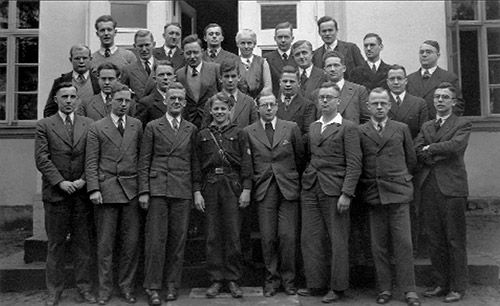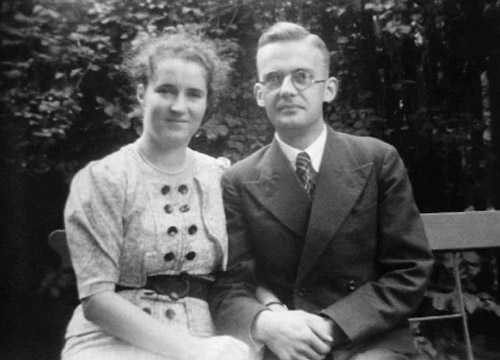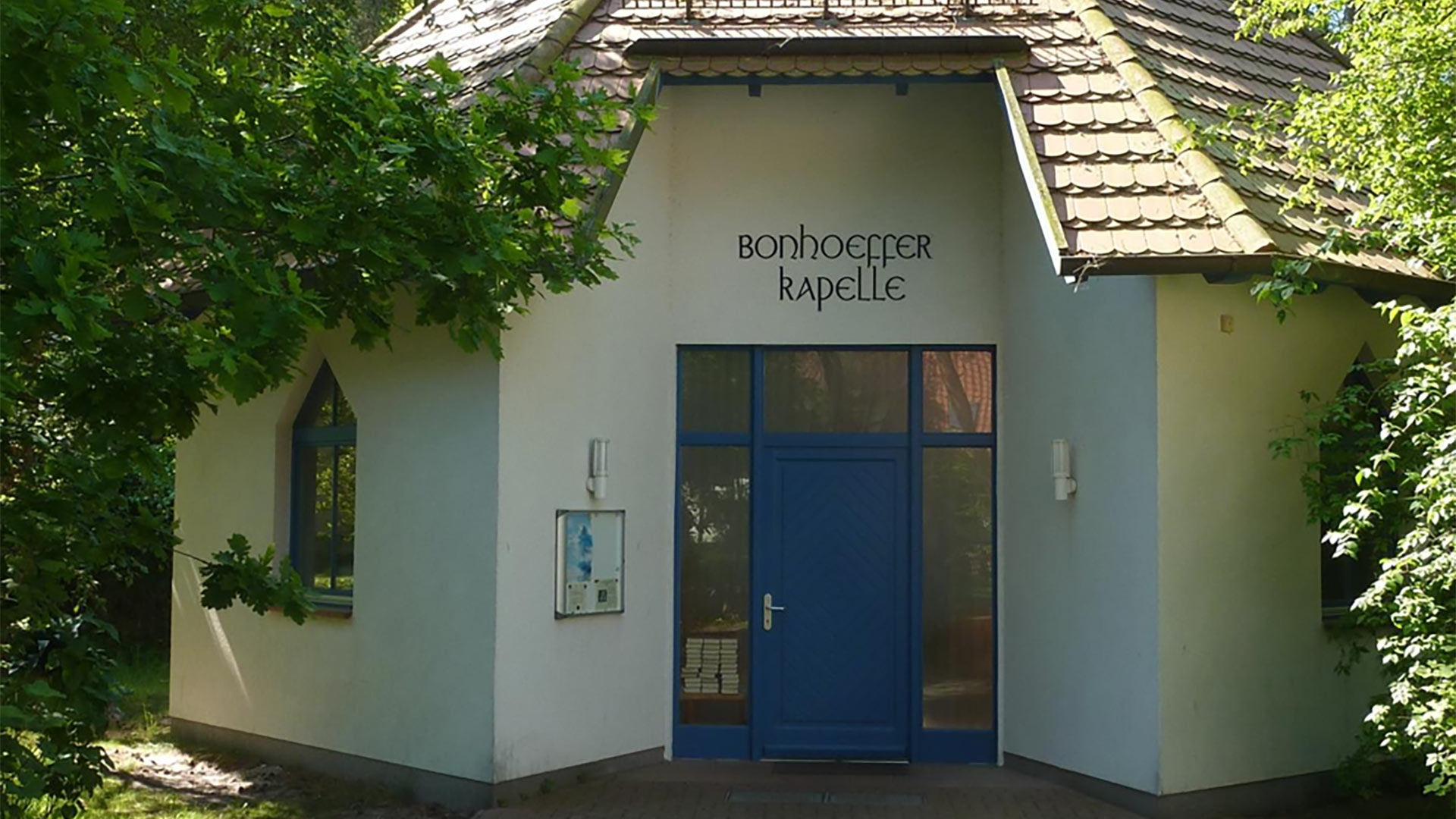One of the benefits of studying Dietrich Bonhoeffer is learning about his friends. Many are well known. Others have been neglected or forgotten. Fritz Onnasch is the least deserving member of that group. Onnasch provides a model of faithful endurance that equals Bonhoeffer’s. His endurance occurred in local, obscure places, which makes him an excellent model for all of us.
Pastor’s Kid and polio victim Friedrich (Fritz) Onnasch was born in 1911. His father, Friedrich, was a pastor who became one of the lions of the Confessing Church. When he was 8 years old, Onnasch contracted polio, the stealthy crippling disease of that era. His right leg was permanently damaged. The family moved to Koslin (pop. 30,000) in Pomerania in 1922, in part to get Onnasch the medical treatment he needed. His father served as pastor of St. Mary’s Church and as district superintendent of over 20 Lutheran churches in the area. Koslin was Onnasch's home base the rest of his life.
With Bonhoeffer in Zingst and Finkenwalde
By April 1935, Onnasch had chosen to seek ministry in the Confessing Church, a small minority within the Protestant church. Thus, he was sent to the new seminary Dietrich Bonhoeffer started at Zingst that eventually settled at Finkenwalde, near Stettin.
Onnasch and four other students from Pomerania took a westward train to Zingst, arriving at the seaside town late on a cold, blustery night. If the five men walked the two kilometers from the train station to the seminary site, then Onnasch limped the whole distance. They found a warm welcome.

Over the next four terms, Onnasch became an indispensable part of the seminary’s ministry while serving as an assistant pastor at a local church. He was one of the members of the “Household of the Brethren,” a ministry team that lived at the seminary and pooled their salaries. Fritz became the household manager, charged with keeping the household accounts and managing the building and grounds. He fulfilled these duties while preaching and conducting confirmation classes at his church. In the fifth and last semester at Finkenwalde, he also became academic director and teacher of Old Testament. Onnasch was at the seminary when the Gestapo came to close it in September 1937.
As the Confessing Church considered next steps for seminary work, Onnasch kept serving his church. On Nov. 18, 1937, he was jailed for leading intercessory prayer for imprisoned pastors and taking up an offering without the government church agency’s approval. Bonhoeffer and Bethge visited him in prison. The experience shook Bonhoeffer, though Onnasch tried to put them at ease.
With Bonhoeffer in Koslin
By December 1937, the Confessing Church had decided to place seven to eight students in two locations: Koslin and Gross Schlonwitz. Onnasch was released from jail on December 20, 1937. He went immediately to Koslin to continue the seminary work with Bonhoeffer. On January 11, 1938, the two attended a meeting of Confessing Church leaders in Berlin to discuss seminary training. They were arrested and held for questioning and banned from meeting in Berlin. They returned to the work, which lasted over a year.

In spring 1939, Bethge and Onnasch accompanied Bonhoeffer to the Berlin airport. Bonhoeffer was headed to the United States for a sabbatical. By September 1939, Bonhoeffer had come home, World War II had begun, and Onnasch had married Margret, Bethge’s sister. Onnasch's father had been in jail for preaching an anti-war sermon and conducting a funeral for a communist. He was given a special pass to do the ceremony.
Faithful unto Death
Onnasch became the leader of young Confessing Church pastors in Pomerania. Of the 300 or so pastors that first signed up with the Confessing Church in Pomerania, as few as 11 refused to accept approval of the government approved church office. Onnasch was one of them.
Onnasch and Margret had hoped to work together in seminary ministry in Koslin. The war ended those hopes, but they were undeterred. When Onnasch was tasked with Confessing Church administrative duties, they rented an apartment in Stettin, the home of the Pomeranian church offices. They eventually had three sons. A daughter died at birth in the midst of a bombing raid. They opened their home to Confessing Church pastors on leave from the army. They fed and housed them at their own expense, thus living out Acts 4:32-37. As time passed, the home became a shelter to refugees, including some Jews. Onnasch visited and preached in churches, many of whose pastors were in the military.
In May 1943, Onnasch's right leg was amputated, but he kept serving the churches. He also served his community as air raid warden in heavily bombed Stettin. As refugees increased and death tolls mounted, he encouraged Christians to open their homes and hearts to the outsider and the hurting. In October 1944, he preached on loving and forgiving one another as a prerequisite for taking communion.
With Stettin becoming so dangerous, the family settled back in Koslin. Onnasch preached in his home church on Christmas Day 1944. His three points were simple: God directs our time; God knows our fate; God wants to make us his children through his Son. Onnasch and Margret decided not to leave their people when evacuation orders came.
By March 4, 1945, the Soviet army was raping and slaughtering its way west to Berlin, avenging the suffering their people had endured from Germany. Onnasch, Margret, their children, and some neighbors were huddled in a cellar. Details vary, but the result is the same. Soviet soldiers seized Onnasch, took him away, and murdered him. The family found him two days later.
Imperturbable Endurance
Bethge described his brother-in-law in one word: imperturbable. Once on the path of the cross of Christ, he did not waver, nor did his wife. They stayed on the path of sacrificial service. While our paths are different today, we do well to consider Onnasch’s path of imperturbable faith and how we might emulate it. Our path may be forgotten on earth, but it will not be forgotten by God. Some days when I am weary, I think of Onnasch limping in the rubble, and I look ahead of him and see Jesus. That gives me perspective and strength.
Listen to a Conversation with Paul House
Paul R. House is professor of divinity at Beeson Divinity School, where he teaches Old Testament and Hebrew. He is the author of Bonhoeffer's Seminary Vision: Recovering Costly Discipleship and Life Together.


